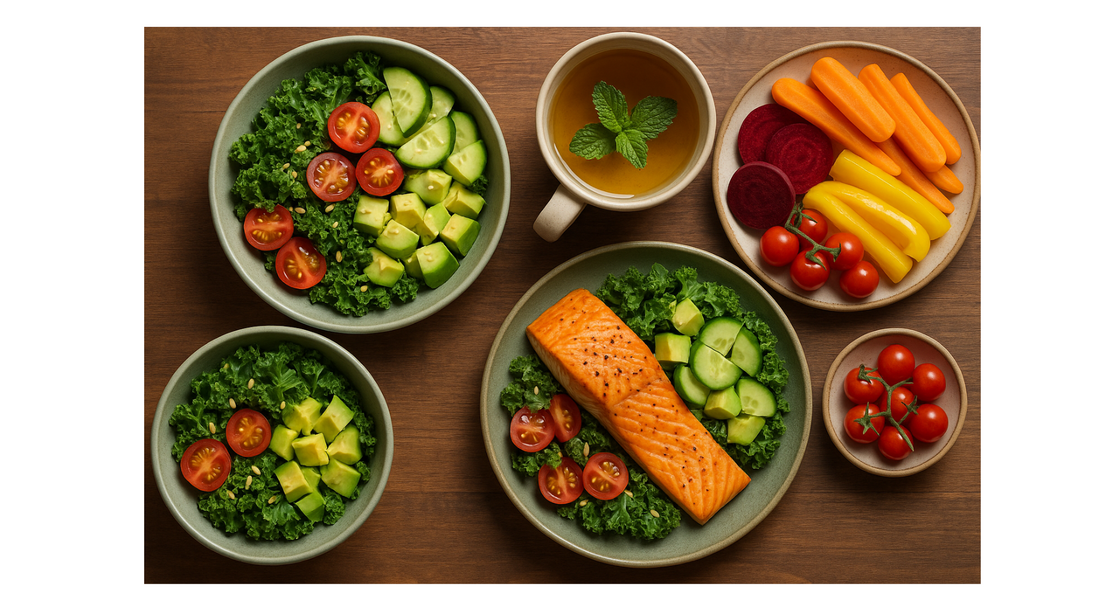
Healing Meals: Anti-Inflammatory Nutrition for Chronic Pain Relief
Share
Chronic inflammation is often linked to conditions such as arthritis, fibromyalgia, autoimmune disorders, and metabolic imbalance. Individuals can support their body’s resilience and experience improvements in pain management and energy by making consistent nutrition choices that nourish the body and minimize pro-inflammatory triggers.
Key Takeaways
|
Chronic inflammation may contribute to ongoing pain and fatigue |
|
Nutrient-dense meals can help support the body’s natural anti-inflammatory response |
|
Whole foods, healthy fats, herbs, and antioxidants play a central role |
|
Processed sugars, refined oils, and artificial additives are often minimized |
|
Sustainable nutrition habits support long-term wellness without rigid restrictions |
Understanding Chronic Inflammation and Diet’s Role

Inflammation is a natural part of the immune system’s defense, but when it becomes chronic, it may lead to pain, swelling, and fatigue. Diet plays a powerful role in modulating this response.
Whole, unprocessed foods rich in phytonutrients, healthy fats, and fiber are foundational in anti-inflammatory eating. Reducing intake of inflammatory triggers such as refined sugars and industrial oils may help ease symptoms over time.
Learn more from Harvard Health on inflammation and diet →
Signs of Chronic Inflammation to Be Aware Of

Some signs that may be associated with long-standing inflammation include:
- Persistent joint or muscle pain
- Brain fog and fatigue
- Digestive issues or bloating
- Skin flare-ups like eczema or redness
- Headaches or sleep disruption
While these symptoms can have many origins, nutritional support may play a valuable role in comprehensive care.
Anti-Inflammatory Pantry Essentials

Stocking the kitchen with ingredients that support a healing response can make daily meal prep easier. Key items to keep on hand include:
- Extra virgin olive oil, flax oil, and avocado oil
- Chia seeds, hemp seeds, and ground flaxseed
- Turmeric, ginger, garlic, and cinnamon
- Canned wild salmon or sardines
- Leafy greens, sweet potatoes, and cruciferous vegetables
- Lentils, quinoa, and gluten-free oats
Having these staples readily available encourages the creation of quick, nourishing meals with anti-inflammatory benefits.
Shop for anti-inflammatory groceries →
Sample Meal Ideas for Pain Management

Here are a few meal templates that incorporate anti-inflammatory foods:
- Breakfast: Oatmeal with blueberries, cinnamon, ground flaxseed, and almond butter
- Lunch: Quinoa bowl with roasted sweet potatoes, kale, chickpeas, and tahini lemon dressing
- Dinner: Grilled salmon with steamed broccoli, turmeric rice, and avocado
- Snack: Hummus with sliced cucumber and red bell pepper
- Beverage: Ginger-turmeric tea or water infused with lemon and mint
These meals combine fiber, healthy fats, and antioxidant-rich ingredients to support stable energy and cellular repair.
Anti-Inflammatory Meals by MindBodyGreen →
Herbs and Spices That May Reduce Inflammatory Load

Natural compounds in culinary herbs and spices are known to influence inflammation pathways. Common options include:
- Turmeric: Contains curcumin, a compound studied for inflammation regulation
- Ginger: May assist with joint comfort and digestive ease
- Cinnamon: Can support glucose balance
- Garlic: Known for immune support and circulatory benefits
Incorporating these flavors into everyday meals enhances both taste and therapeutic potential.
Hydration and Anti-Inflammatory Fluids
Proper hydration aids nutrient delivery, joint lubrication, and toxin removal. Anti-inflammatory fluids include:
- Filtered water with lemon or cucumber
- Green tea and matcha
- Herbal teas such as rooibos, nettle, or turmeric-ginger blends
- Coconut water for natural electrolytes
Avoiding sugary beverages and prioritizing fluids that contain antioxidants or minerals may be beneficial for pain and inflammation levels.
Gut Health and Its Link to Chronic Inflammation
The gut lining plays a critical role in regulating the immune response. Disruptions to gut health may influence systemic inflammation. To support gut integrity:
- Include prebiotic-rich foods like onions, garlic, leeks, and asparagus
- Add fermented items such as sauerkraut, kefir, or plain yogurt
- Eat diverse plant fibers to feed beneficial bacteria
Gut-friendly meals can help maintain barrier function and reduce inflammatory triggers from within.
Lifestyle Support for Inflammation Reduction

Balanced nutrition works well when paired with lifestyle routines that minimize inflammation triggers. These include:
- Prioritizing quality sleep
- Engaging in regular, low-impact physical activity
- Practicing mindfulness, deep breathing, or stress management techniques
- Reducing exposure to environmental toxins and irritants
Daily habits that promote emotional and physical well-being can enhance the benefits of anti-inflammatory eating.
Supplements Often Used in Anti-Inflammatory Plans

Some people choose to complement their food-based strategies with dietary supplements. Common examples include:
- Omega-3 fatty acids (from fish oil or algae oil)
- Curcumin (from turmeric root)
- Magnesium
- Probiotics
- Vitamin D
Consulting a healthcare provider or integrative practitioner is recommended to personalize dosage and ensure compatibility with individual needs.
Long-Term Nutrition Strategy for Pain Relief
Consistency is key in achieving results with an anti-inflammatory approach. By making sustainable, satisfying choices, individuals can:
- Support joint health and reduce discomfort
- Promote better digestion and immune balance
- Experience steadier energy and fewer inflammatory symptoms
The goal is not restriction, but nourishment that allows the body to function more comfortably over time.
Frequently Asked Questions
-
Can food help reduce chronic pain?
Yes, nutrition can play a supportive role by reducing inflammatory triggers and supplying nutrients that promote healing. -
What are the best foods to eat for inflammation?
Fruits, vegetables, fatty fish, olive oil, nuts, and seeds are often included in anti-inflammatory nutrition. -
Are there foods that worsen inflammation?
Highly processed foods, trans fats, refined sugars, and additives may contribute to inflammatory responses. -
How soon can someone feel benefits from anti-inflammatory meals?
Each body is different, but some individuals may notice improved energy or digestion within weeks of consistent changes. -
Is anti-inflammatory eating safe long term?
Yes. A whole-foods, nutrient-focused approach is generally safe and sustainable when balanced and flexible.
